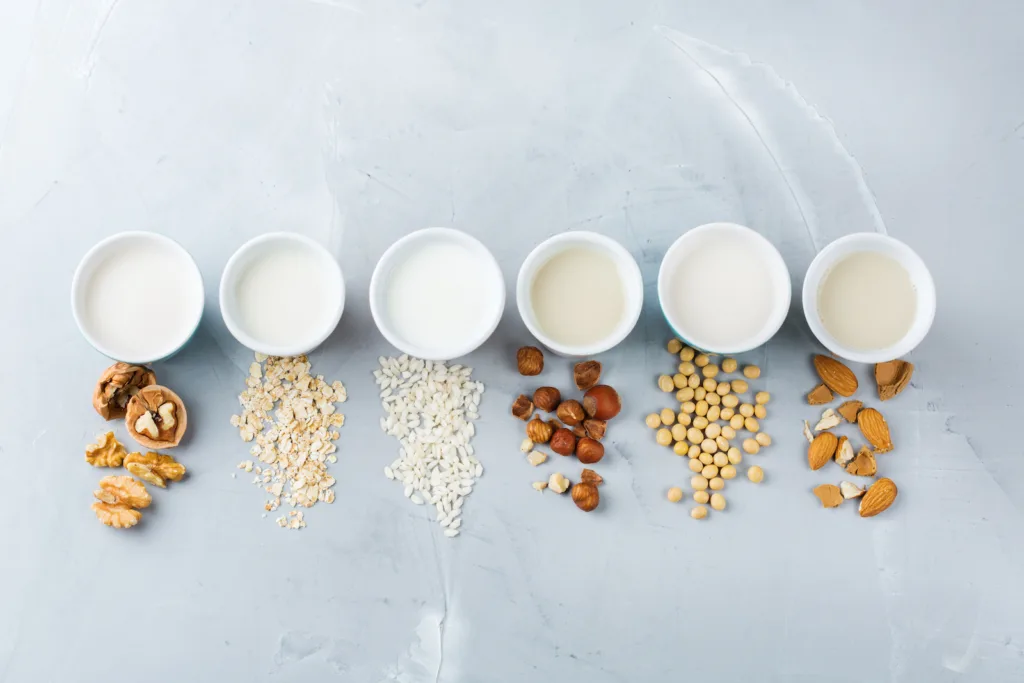By Emma Stessman
In an ideal world, nut milks would be made with just two ingredients: nuts and water.
But if you’ve spent a few minutes (or hours?) reading labels in the alternative milk aisle at the grocery store, you know that’s not generally the case. Most include a laundry list of ingredients that range from the to-be-expected almonds and sea salt to additives that might as well be in a foreign language. (Try saying d-alpha-tocopherol five times fast, for example.)
While it’s obvious you’ll want to steer clear of some ingredients, like lots of added sugar, others are more mysterious. Keep in mind: Most of these ingredients are added to prevent funky textures or consistencies, and you’re likely not consuming any of them in substantial enough amounts for them to affect your health. But you should know what you’re sipping, so you can happily whip up almond milk lattes and cashew milk smoothies without wondering what the heck a “gum” is and why it’s in your nut milk in the first place.
And hey, don’t forget, it’s so much easier than you think to make your own fresh and tasty nut milk at home with this recipe.
5 of The Most Common Nut Milk Additives
1. Guar gum
Guar gum is a super common additive, used as a binding and thickening agent in many nut milks as well soups and salad dressings. It’s high in soluble fiber, and because of that, research shows it could actually be helpful in keeping you full for longer and regulating blood sugar. The one caveat is that when it’s consumed in large amounts, it can obstruct your digestive system and cause some serious issues. But no need to worry. Since the FDA regulates the amount of guar gum used in food, it’d be nearly impossible for you to get enough to start seeing any issues––the worst thing you might experience is some mild gas, but even that’s pretty unlikely.
2. Gellan gum
Another one of the “gums” that shows up frequently on ingredient lists. This thickener is similar to xanthan gum (another common additive which you can read Keri’s full thoughts on here) in the way that it’s made by fermenting sugar with a certain kind of bacteria. So far, no negative effects of consuming gellan gum have been shown. One animal study found that it may help with constipation by shortening the travel time through the GI tract, but further studies are needed.
3. Pea protein
Since many milks made with almonds contain very few of the actual nuts themselves in the finished product, they tend to be pretty low in protein. That’s why many companies add pea protein for a plant-based protein boost. The cool thing is that pea protein is a super sustainable alternative to typical animal-based protein additives like whey or casein.
RELATED: The Essential Guide to Plant-Based Protein
4. Tapioca starch
Yes, it’s the same ingredient found in that thick pudding your mom used to make, and in bubble tea. Tapioca is a really great thickener (hence its use in puddings), but instead of being turned into small balls or pearls, as we’re used to seeing it, the version added to your nut milks is just the straight powdery starch. Tapioca starch has very little nutritional value. It consists mostly of carbohydrates and there are no real benefits or risks to eating it. The good thing is, it’s allergen friendly. It’s made from the cassava plant, so it’s gluten-free and is a great thickening replacement for cornstarch or regular flour, for those who may have corn or wheat allergies.
RELATED: The Six Best Gluten-Free Flours
5. Carrageenan
This is one of the more controversial ingredients you’ll find on a nut milk label. Carrageenan, an additive derived from red seaweed, is used pretty commonly in shelf-stable nut milks as a thickening and emulsifying agent. Some evidence links it to digestive distress and serious health issues like inflammation and cancer (but more human studies are needed to confirm the exact extent of the risks). Though this additive is “generally recognized as safe” by the FDA, we follow the precautionary principle and recommend sticking to “carrageenan-free” nut milks. Pro tip: nut milks without carrageenan may be more likely to separate, so just give them a good shake or two before drinking or adding to your morning cold brew.
Oh, and that d-alpha-tocopherol, by the way…that’s just added vitamin E. Nothing to worry about there.
(Featured Photo: Shutterstock)
